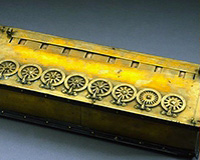Soutenance de thèse d'Alain-Georges Sabathé

19 novembre 202414h
Cnam, Amphi Abbé Grégoire
Soutenance de thèse pour l'obtention d'un doctorat en Sciences humaines et humanités nouvelles - spécialité Travail social
Le rôle des associations étudiantes dans la professionnalisation et la construction de l’identité professionnelle des ingénieurs.
sous la direction de Patrick Obertelli, Professeur émérite à CentraleSupélec, U. Paris Saclay
Jury
- Mme Emmanuelle ANNOOT, Professeure, Université de Rouen, Rapporteure
- M. Richard WITTORSKI, Professeur, Université de Rouen, Rapporteur
- M. Denis LEMAÎTRE, Professeur des universités, École Navale, Examinateur
- Mme ADAM Catherine, Maître de Conférences, ENSTA Bretagne, Invitée
Résumé de thèse
L’auteur a entamé sa thèse après dix ans de suivis d’élèves ingénieurs FHTT, huit ans de Jury de diplomation EICNAM, un M2 sur « Les ingénieurs à la française ». En 2016, dès que doctorant, il écrivait : « La figure de l’ingénieur est une problématique à part entière. Sa facture en détient les clefs. La focale des Associations étudiantes est l’entrée principale de ce doctorat. Le cadre associatif est un observatoire intéressant de la métamorphose des élèves en ingénieurs, professionnels diplômés. La compréhension des étapes est la sine qua non pour analyser les activités associatives estudiantines, identifier les construits identitaires, découvrir la professionnalisation. L’associatif d’école modèle l’élève pour sa future sociabilité. Comprendre le rôle des associations étudiantes est l’enjeu de cette recherche restreinte au cadre temporel des professionnalité et professionnalisation ». Ici, la vision de l’ingénierie est historique, légale, spatiale, humaine. Où ils agissent, les acteurs sont décrits dans leurs rôles, charges et actes. Toujours en rapport à l’associatif. Les concepts utilisés éclairent les lieux et processus qui métamorphosent l’élève en professionnel. Terrain et recherche se déclinent en trois temps. Un collaboratif d’écoute par entretiens semi-directifs. Un transcrit intégral pour éclairer la parole collective. Des enseignements qui répondent aux hypothèses. Le chemin de compréhension se termine par une "proposition de filature" qui génère une professionnalité initiale P0, qui crée des professionnalités non linéaires successives, génératrices de professionnalisation. Qui parcourra le chemin effectué ici, obtiendra un éclairage original sur « Le rôle des associations étudiantes dans la construction de l’identité professionnelle des ingénieurs.
Mots clefs :
Ingénieur, Associations étudiantes, Formation, Apprentissages, Identité, Identité professionnelle, Processus de Professionnalisation, Diégèse, Risque, Engagement
Abstract
The author began his thesis after ten years of follow-up of FHTT engineering students, eight years of EICNAM Diploma Jury, an M2 on "French engineers". In 2016, as soon as he was a doctoral student, he wrote: "The figureof the engineer is a problem in its own right. His invoice holds the keys. The focus of Student Associations is the main entry point of this PhD. The associative framework is an interesting observatory of the metamorphosis of students into engineers, qualified professionals. Understanding the stages is the sine qua non for analysing student associative activities, identifying identity constructs and découvrir professionalization. The school association models the student for his or her future sociability. Understanding the role of student associations is the challenge of this research, which is restricted to the temporal framework of professionality and professionalization ". Here, the vision of engineering is historical, legal, spatial and human. Where they act, the actors are described in their roles, charges and actions. Always in relation to associations. The concepts used shed light on the places and processes that transform the student into a professional. Fieldwork and research are divided into three stages. A collaborative listening through semi-structured interviews. A complete transcript to enlighten the collective voice. Lessons that respond to the hypotheses. The path of understanding ends with a "spinning proposal" that generates an initial P0 professionality, which creates successive non-linear professionalities, generating professionalization. Those who follow the path taken here will obtain an original insight into "The role of student associations in the construction of the professional identity of engineers".
Keywords :
Engineer, Student Associations, Training, Apprenticeships, Identity, Professional identity, Professionalization Process, Diegesis, Risk, Commitment

19 novembre 202414h
Cnam, Amphi Abbé Grégoire


